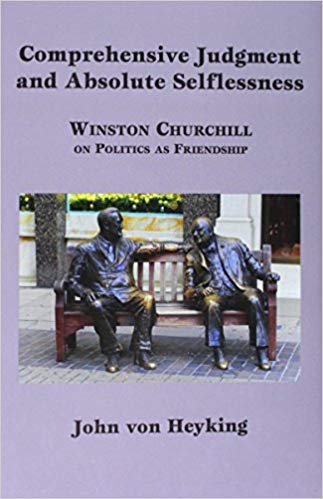
Finest Hour 181
Books, Arts, & Curiosities – A Friend in Need

October 4, 2018
Finest Hour 181, Summer 2018
Page 46
Review by Richard A. McConnell
John von Heyking, Comprehensive Judgment and Absolute Selflessness: Winston Churchill on Politics as Friendship, St. Augustine’s Press, 2018, 200 pages, $27. ISBN 978–1587311604
Richard A. McConnell is Associate Professor in the Department of Army Tactics at the US Army Command and General Staff College.
Winston Churchill was a vigorous orator known for his expertise at arguing his point and implacably pursuing his goals. Yet he had the ability to pursue friendships with many of his political opponents. Today, when friendships across the aisle seem nonexistent, these two aspects of Churchill seem peculiarly paired. In Comprehensive Judgment, John von Heyking explores the notion that political statesmanship, although characterized by opposing viewpoints in conflict between political rivals, must include an aspect of friendship. In fact, one could argue that Churchill’s approach to politics simultaneously acknowledged the importance of the rules that govern society while also understanding that these rules were insufficient by themselves to create ordered governance. Friendship must augment rules for governing to be effective, von Heyking argues, and his achievement is to provide engaging descriptions of the philosophical foundations of such political fellowship in the context of the friendships of Winston Churchill.

2024 International Churchill Conference
Von Heyking first examines how early philosophers viewed the connection between friendship and the governing of nations. One such concept is known as “sunaisthesis,” which means shared vision. By obtaining sunaisthesis through political friendship, Churchill was able to gain a deeper understanding of his environment through empathy with his political contemporaries. One practical way Churchill pursued sunaisthesis was by co-founding the Other Club with his close friend F. E. Smith when the two men served competing political parties. In the now-fabled dining club, political opponents were often seated next to each other over dinner so that the conflicts of the day could be set aside in order to cultivate dialogue between diverse perspectives. In essence, Churchill was attempting to encourage opponents to elevate their gaze to higher human purposes through friendship.
Readers may ask, how can such diverse perspectives find common ground? The answer is magnanimity. Magnanimity is the greatness of soul or loftiness of purpose that allows someone to see beyond the conflict of the now to the higher objective. Churchill demonstrated this quality in many of his friendships. Lord Beaverbrook, for example, was a friend but also a rival. Both Churchill and Beaverbrook were able to be magnanimous towards one another when they saw that, although they did not always agree, they could appreciate how each sought honor and truth in their dealings.
This does not mean that such friendships are always harmonious. In fact, many of Churchill’s friendships were at times filled with friction. The ability to be magnanimous, however, constantly intervened to nurture what became long-term friendships of incredible consequence. One such relationship was Churchill’s wartime collaboration with President Roosevelt. These two dynamic leaders managed to become friends even though their interests at times diverged.
Von Heyking argues that one way to overcome diverging perspectives is by gaining understanding through the power of story. In one of his most compelling passages, von Heyking discusses the connection between virtuous friendship and the power of narrative. Churchill is famous for referring to the history of Britain as our “island story.” Many scholars argue that Churchill saw himself as a primary composer of that story and used that narrative to great effect in many of his speeches and books. Churchill viewed great action on the world stage as incomplete if the story had not been told.
Von Heyking also provides an engaging description of the essential connection between political life and friendship. In the act of intentionally engaging opponents in dialogue, fellowship, and social interaction, those involved in government may gain the empathy required to govern wisely. Such relationships might help colleagues fill in the blanks between that which is morally right versus that which merely appears morally right. Comprehensive Judgment is for anyone interested in gaining understanding of the philosophical foundations of virtuous friendships. Such relationships could potentially encourage political leaders to find common ground, work with rivals, and see the higher purpose for their work and interaction. Churchill pursued such relationships, and they helped him change the world for the better.
Subscribe
WANT MORE?
Get the Churchill Bulletin delivered to your inbox once a month.


